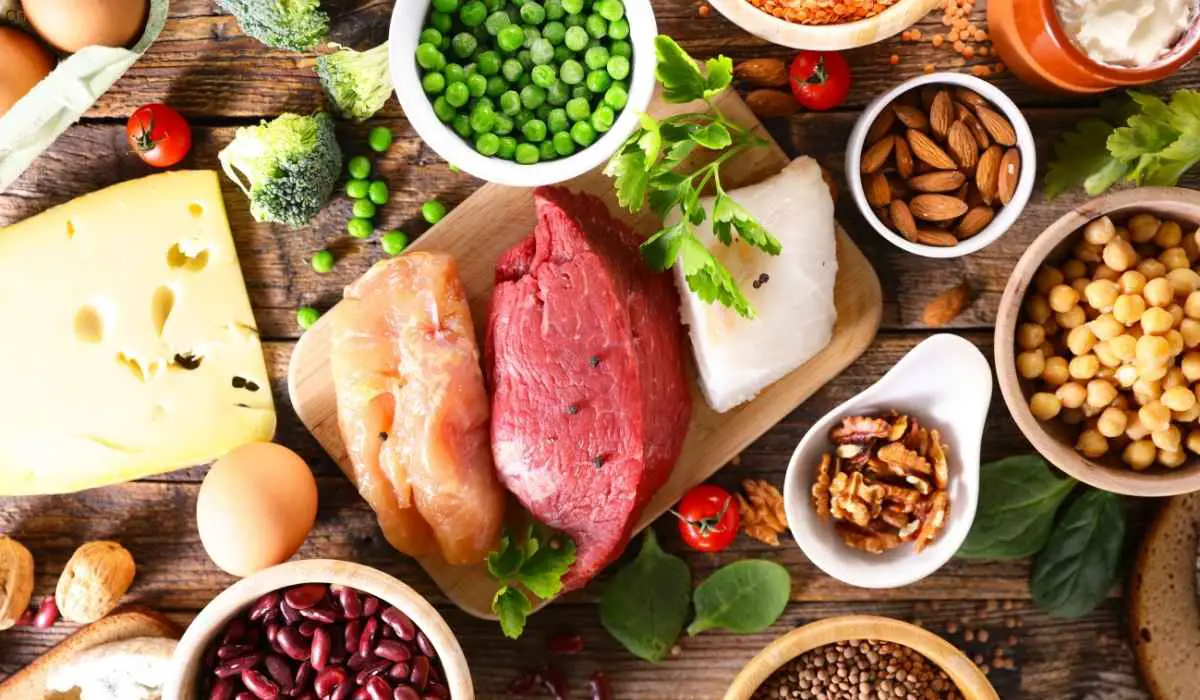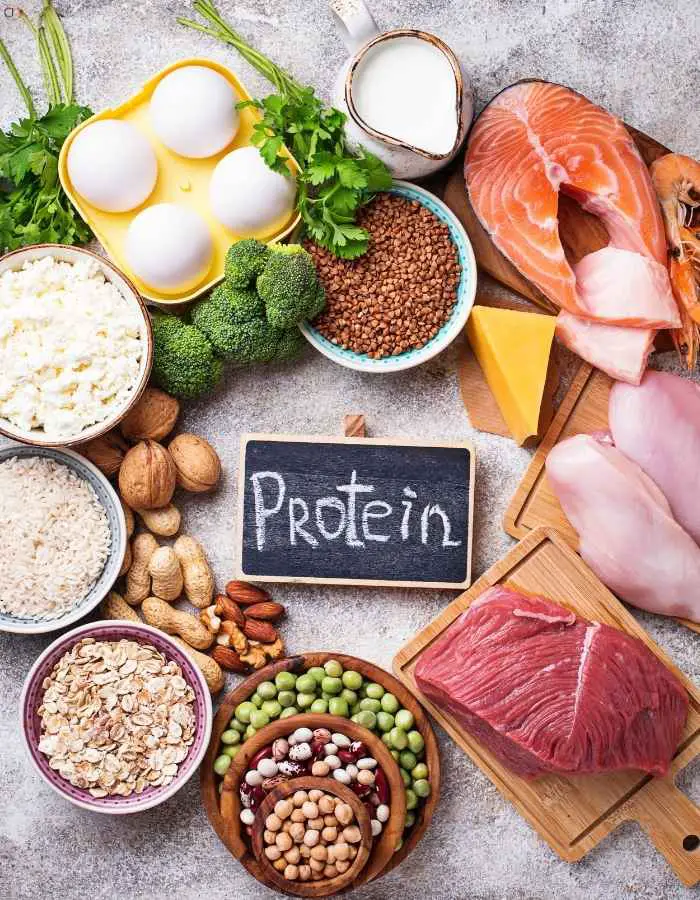10 High Protein Foods

Protein is an essential part of a balanced diet, helping to keep you full, support muscle growth, and maintain overall health.
If you’re meal prepping, looking for quick snacks, or planning nutritious dinners, incorporating high protein foods can make eating well simple and enjoyable.
Let’s explore some tasty and versatile High Protein Foods options that fit perfectly into any lifestyle!
What Is Protein and Why Do We Need It?
Protein is one of the essential building blocks of life—made up of amino acids, it plays a vital role in nearly every function of the body.
From repairing tissues and building muscles to producing enzymes and hormones, protein keeps your body running smoothly.
Unlike fats and carbs, protein also helps you feel fuller for longer, making it a key player in weight management and energy balance.
If you’re an athlete aiming to build muscle or just looking to stay healthy, getting enough protein is crucial for overall wellness and daily vitality.
Top Sources of High Protein Foods:
Including a variety of High Protein Foods in your diet helps you get all the essential amino acids your body needs. Here are some of the best sources, both from animals and plants:
1. Animal-Based Proteins:
-
Chicken and Turkey: Lean, versatile, and packed with protein.
-
Fish and Seafood: Salmon, tuna, shrimp, and more — rich in protein and healthy omega-3 fats.
-
Eggs: A complete protein source, perfect for any meal of the day.
-
Dairy: Greek yogurt, cottage cheese, and milk offer protein along with calcium and other nutrients.
2. Plant-Based Proteins:
-
Legumes: Beans, lentils, and chickpeas are excellent protein-packed staples.
-
Tofu and Tempeh: Great soy-based options for vegetarians and vegans.
-
Quinoa: A complete plant protein that’s also gluten-free and easy to cook.
-
Nuts and Seeds: Almonds, chia seeds, pumpkin seeds, and more provide protein plus healthy fats.
Mixing these sources ensures you enjoy diverse flavors and balanced nutrition every day!
Benefits of High Protein Foods:
Adding high protein foods to your diet offers a wide range of health benefits that go beyond just muscle building:
1. Supports Muscle Growth and Repair:
Protein provides the essential amino acids needed to build and repair muscle tissues, especially important after exercise or injury.
2. Helps You Feel Full Longer:
Protein-rich foods increase satiety, helping control hunger and reduce overeating, which is great for weight management.
3. Boosts Metabolism:
Eating protein can increase your metabolic rate because your body uses more energy to digest it compared to fats and carbs.
4. Supports Healthy Bones:
Protein plays a role in maintaining strong bones and may reduce the risk of osteoporosis as you age.
5. Helps Maintain Healthy Skin, Hair, and Nails:
Protein is vital for the production of keratin and collagen, key components for healthy skin, hair, and nails.
Incorporating enough protein into your meals supports overall wellness and helps keep your body functioning at its best!
Easy Ways to Add More Protein to Your Diet:
Boosting your protein intake doesn’t have to be complicated. Here are simple and practical tips to include more protein in your daily meals and snacks:
1. Start Your Day with Protein:
Add eggs, Greek yogurt, or a protein smoothie to your breakfast for lasting energy.
2. Snack Smart:
Keep nuts, cheese sticks, or roasted chickpeas handy for quick protein-packed snacks.
3. Include Protein in Every Meal:
Add beans or lentils to salads and soups, or top your dishes with grilled chicken or tofu.
4. Swap Refined Carbs for Protein-Rich Alternatives:
Choose quinoa or whole grains with higher protein content instead of white rice or pasta.
5. Use Protein Powders:
Add protein powder to smoothies, oatmeal, or even baked goods for an easy protein boost.
6. Prepare Meals Ahead:
Cook and portion out protein-rich foods like hard-boiled eggs, grilled meats, or roasted chickpeas for grab-and-go convenience.
With these easy swaps and additions, hitting your protein goals can be simple and delicious!
Sample High Protein Meal Ideas:
Here are three tasty and easy meal ideas to help you get more protein throughout your day:
1. Breakfast:
Veggie Omelette with Cheese
Whip up eggs with your favorite veggies (spinach, tomatoes, peppers) and a sprinkle of cheese for a protein-packed, energizing start.
2. Lunch:
Quinoa Salad with Chickpeas and Grilled Chicken
Combine cooked quinoa, chickpeas, grilled chicken strips, cherry tomatoes, cucumbers, and a light lemon dressing for a fresh and filling meal.
3. Dinner:
Baked Salmon with Roasted Veggies
Enjoy a juicy baked salmon fillet paired with roasted broccoli, carrots, and sweet potatoes — a perfect balance of protein and nutrients.
These meals are simple to prepare and great for keeping your protein intake on point!
Common Myths About Protein:
Let’s clear up some common misunderstandings about protein so you can make informed, healthy choices:
1. Myth: Eating too much protein is bad for your kidneys.
Truth: For healthy individuals, high protein intake is generally safe. Kidney concerns usually apply to those with pre-existing kidney issues.
2. Myth: You can only get enough protein from meat.
Truth: There are plenty of plant-based protein sources like lentils, tofu, beans, and quinoa that can meet your protein needs.
3. Myth: More protein means more muscle.
Truth: While protein supports muscle growth, it needs to be paired with strength training for noticeable muscle gain.
4. Myth: Protein makes you bulky.
Truth: Eating protein alone won’t bulk you up; muscle gain requires consistent exercise and overall calorie surplus.
5. Myth: You need protein supplements to meet your goals.
Truth: Most people can meet their protein needs through a well-balanced diet without supplements.
Understanding these myths can help you make smarter, more balanced dietary choices!
Key take away:
- High protein foods are essential for building muscle, supporting metabolism, and keeping you full and energized throughout the day. Whether you’re a meat lover or plant-based eater, there are plenty of delicious options to meet your protein needs.
- Save this guide on Pinterest and share it with friends looking to boost their nutrition in simple, tasty ways!
Read Next: Picnic Foods Ideas
FAQs:
1. How much protein do I need daily?
Most adults need about 0.8 grams of protein per kilogram of body weight, but active individuals may require more.
2. Can I get enough protein on a vegetarian or vegan diet?
Yes! Plant-based sources like lentils, beans, tofu, tempeh, and quinoa can provide ample protein when eaten in variety.
3. Is it okay to eat protein at every meal?
Absolutely. Spreading protein intake throughout the day helps with muscle maintenance and keeps you feeling full.
4. Do protein supplements work?
Protein supplements can help if you struggle to meet your needs through food, but whole food sources are always ideal when possible.
5. What are signs I might not be getting enough protein?
Common signs include fatigue, muscle loss, hair thinning, and frequent hunger despite eating.






